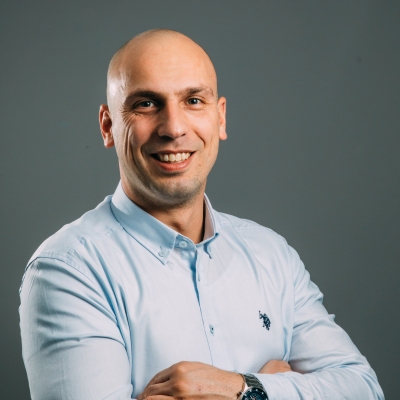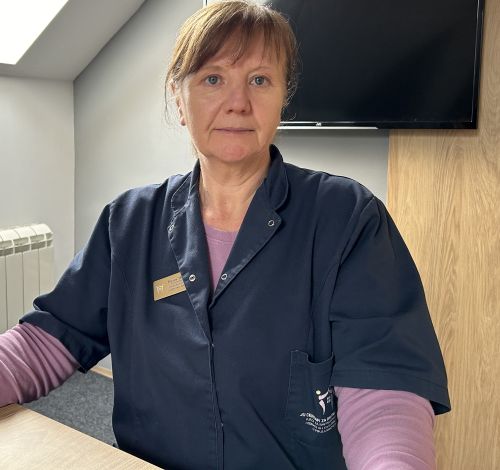A network of publicly funded facilities helps Montenegrin kids get the treatment and education they urgently need.
Almost every day at the same time, Maksim walks into the center for children and youth with disabilities in the Montenegrin city of Cetinje. Maksim is seven, and for more than two years, the center’s therapists have been working with him to help him have a childhood like his peers.
“Maksim really likes coming here,” says his mother, Dijana Popovic.
Speech therapists, physiotherapists, and teachers work with the boy, and the progress he makes is very visible, she says, praising their selfless work on behalf of Maksim and other children.
“The staff are professional and friendly. The center is close to our house, and finally we don’t have to travel to Podgorica for Maksim to receive therapy. It was very exhausting for us and for him,” she says.

A Nationwide Web of Centers
Montenegro’s first state-run center for children and youth with disabilities opened its doors in 2004. The center in Cetinje, a historic city of 16,000 inhabitants an hour’s drive from Podgorica, opened in 2013. The center currently serves 29 clients.
The three-story facility is equipped with a physical therapy room, a Montessori classroom,and several playrooms. There is also a sensory room, a room for assisted play, and a room for speech therapy.
Staff prepare daily schedules for each child.
“The program is adapted to each child and depends on their potential,” explains Dijana Mladjen, a preschool teacher who has worked at the center since it opened.
The center’s users have various kinds of impairments, both physical and intellectual. For younger children especially, there are no fixed boundaries between therapy and play. The sensory room, for instance, with its lights, colors, sounds, and soft toys, is a place for safe exploration and development of sensory faculties as well as a space where kids can play and socialize.
On the top floor, there are offices and a meeting room. From his office on this floor, center director Bozo Drecun says that when a child arrives with a smile and doesn’t cry but asks his parents to bring him to therapy, you know that your users are satisfied and that you are doing a good job.
“The progress in working with children can be seen,” says Jovan Martinovic, a psychologist who interacts with younger children in individual therapy sessions. “However, it depends on the child’s problem whether progress is seen a little faster or slower.”
Montenegro, with a population of just over 600,000, is divided into 25 municipalities. Sixteen host a center for children and youth with developmental disabilities (two centers are located in Podgorica, for a total of 17 facilities), so not all towns and cities can provide this service. The work of the centers is regulated by the law on social and child protection, and their services are of free of charge.
The majority of clients at the centers are severely disabled, often with multiple impairments, according to the executive director of the Association of Youth with Disabilities of Montenegro, Marina Vujacic.
Some clients of the centers attend school elsewhere, Vujacic notes, although others receive all their education at the centers.
In Cetinje, the center develops educational activities to equip clients with skills needed in their everyday lives, and offers additional support for those who go to school elsewhere.
As of the end of 2022, the centers served 375 users and 64 percent were children under 18, according to data from the Bureau for Social and Child Protection. Youth aged 18 to 26 comprised a quarter of the clients, and adults the remainder.

Regional Differences
“Every municipality should have at least one center,” says Savo Knezevic, director of the National Association of Parents of Children and Youth with Disabilities of Montenegro, or NARDOS. “These institutions provide professional and physical care for children while parents work or perform other duties.”
Knezevic argues that there is a need for a registry of disabled people, either on the municipal or national level. The provision of health and other services varies from region to region, and care for the disabled is either absent or poorly developed especially in the north and south of the country, he says.
Twenty years ago, parents of children with disabilities pushed for the opening of the country’s first day center in the northern town of Bijelo Polje as a much-needed service to the local community, Knezevic says.
Currently, the 17 centers employ 257 staff, of whom 63 percent work directly with clients.
Taking Cetinje as an example, clients of the center there can use the services of education experts, physiotherapists, psychologists, speech therapists, and special education teachers.
“Our center has no financial problems, but it has a problem with finding staff,” according to center director Drecun. The center does not directly employ special education teachers, rather hiring them on a part-time basis.
“The problem I recognize, as a parent of a child with developmental disabilities, is that this institution does not have enough employees, which is why our children cannot have more classes that last longer,” Dijana Popovic says.
The lack of a pool of professional personnel, mainly speech therapists and teachers specializing in disabled children, is felt in most of the centers, as well as by parents seeking more individualized therapy that the centers cannot provide.
Individual attention to each client is an ideal, but the shortage of staff means that not every child at the Cetinje center can benefit in the same way, Drecun says.
“If you have a speech therapist who comes once a week, you have to make a selection among the children. The professional determines who needs the service more – it is more necessary for a child who has not yet spoken than for a child of 16 or 18, for instance. The parents’ suggestion for more individual treatments is justified, but unfortunately, we don’t have the staff,” he says.
The Law and the Reality
Vujacic of the Association of Youth with Disabilities points out that the centers are important, providing support to users and their families, but like any other service, they also have their shortcomings or limitations.
“The critical disadvantage is that users do not have the option of choosing those services that best suit their real needs and requirements,” she says.
Although the law on social care is meant to guarantee a diverse range of services and service providers, for now, she adds, this is “only at the level of norms, not practice.”
She also adds that precisely because of the insufficient development of services, many people with disabilities of all ages are on waiting lists or do not have any services provided.
The Ministry of Labor and Social Welfare says it is committed to “enhancing policies and developing strategic documents” to build the capacity of the day centers and other services catering to children and young people with disabilities.
Yet, funding constraints, a dearth of qualified therapists and other staff, and the uneven distribution of social services between the better-off and poor regions continue to hamper the provision of services to some of Montenegro’s most needy children and young people.
Another drawback, Knezevic says, is that since many clients of the centers are diagnosed with autism, children with other developmental disabilities often go on a waiting list, facing their parents with the difficult choice of reducing their working hours to be with the child or finding alternatives to the centers. Kindergartens and regular schools cannot accommodate all these children, he explains.
The UN children’s agency UNICEF lends its expertise and sometimes funds to investment projects concerning infrastructure, materials, and skilled staff for child and youth health programs in many countries. To address these needs in Montenegro, in 2021 the local UNICEF office set up the Business Council for Children’s Rights, comprising entrepreneurs and companies. The council is currently raising funds to equip existing daycare centers in Montenegro according to their needs.

We Grow With Them
Looking ahead, Vujacic believes that the system of care for people with disabilities would benefit from comprehensive monitoring and reevaluation, both to highlight the positive results and identify areas in need of improvement.
“This type of analysis should be conducted as independent monitoring to ensure impartiality and exclude potential bias. It is high time that such activity be carried out, bearing in mind that many years have passed since the establishment of the first such service in Montenegro,” she says.
Celebrating the first decade since its founding, last November the day center in Cetinje ran a publicity drive using the slogan “We grow with them.”
Montenegrin athletes and celebrities were invited to the celebration.
“This must not be a taboo topic,” pro basketballer Petar Popovic said, referring to the center and its work.
“We must speak openly because our goal is to show that we are an open and tolerant society,” he said.
“This message is for all children with disabilities and their peers who embraced them and improved their lives. This is a message for their parents and all of us who are raising new generations by building a better society,” center head Drecun told the guests.
…
Teodora Djurnic works for the Montenegro Media Institute, an organization that promotes higher standards of journalism, media literacy, and freedom of expression.



